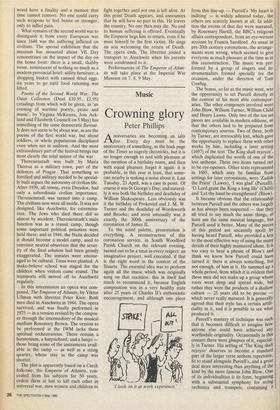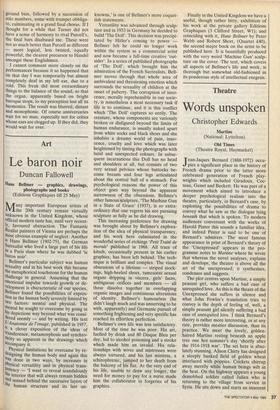Music
Crowning glory
Peter Phillips
A nniversaries are becoming an idee .A.fixe. Every day must be the anniversary of something, as the back page of the Times so eagerly chronicles, but it is no longer enough to nod with pleasure at the mention of a birthday name, and then with equal pleasure forget it again: it is probable, in this year at least, that some- one nearby is making a noise about it. Last Tuesday, 23 April, was a case in point. Of course it was St George's Day; and natural- ly it was both the birthday and deathday of William Shakespeare. Less obviously was it the birthday of Prokovief and J. M. W. Turner and the deathday of Wordsworth and Brooke; and most unusually was it exactly the 300th anniversary of the coronation of James II.
To the sated palette, presentation is everything. A reconstruction of this coronation service, in South Woodford Parish Church on the relevant evening, turned out to be a treat in every respect: an imaginative project, well executed, if that is the right word in the context of the Stuarts. The essential idea was to perform again all the music which was originally sung on that occasion: this in itself had much to recommend it, because English composition was in a very healthy state after 25 years of Charles II's enthusiastic encouragement, and although one piece look on it as work experience.'
from this line-up — Purcell's 'My heart is inditing' — is widely admired today, the others are scarcely known at all. In addi- tion the events of that day were narrated, by Rosemary Hartill, the BBC's religious affairs correspondent, from an eye-witness account by Francis Sandford. As usual in pre-20th century coronations, the arrange- ments went wrong, which seemed to give everyone as much pleasure at the time as in this reconstruction. The music was per- formed by a group of singers and in- strumentalists formed specially for the occasion, under the direction of Tom Cowhig.
The bonus, so far as the music went, was the opportunity to set Purcell directly in the context of his most able contempor- aries. The other composers involved were John Blow, William Turner, William Child and Henry Lawes. Only two of the ten set pieces are available in modern editions, so that the others had to be prepared from contemporary sources. Two of these, both by Turner, are irrevocably lost, which gave the opportunity to replace them with other works by him, including a later setting (1697) of the text 'The King shall rejoyce', which duplicated the words of one of the lost anthems. These two items turned out to be eye-openers. Other texts represented in 1685, which may be familiar from settings for later coronations, were 'Zadok the Priest' (Lawes), 'I was glad' (Purcell), '0 Lord grant the King a long life' (Child) and 'Let thy hand be strengthened' (Blow).
It became obvious that the relationship between Purcell 'and the others was largely as has always been suspected — that they all tried to say much the same things, at least use the same musical language, but Purcell used it better. Many of the pieces of this period are uncannily spoilt by having heard Purcell, who provided a key to the most effective way of using the many details of their highly mannered idiom. It is too easy to hear a phrase of Blow's and think we know how Purcell could have turned it: there is always something, but not enough, of him in it. He summed up a whole period, from which it is evident that these men did not make up a group whose roots went deep and spread wide, but rather they were the products of a shallow culture — 25 years old to be precise — which never really matured. It is generally agreed that their style has a certain artifi- ciality in it, and it is possible to see what produced it. Purcell's mastery of technique was such that it becomes difficult to imagine how anyone else could have achieved ally worthwhile originality. Occasionally in this concert there were glimpses of it, especial- ly in Turner. His setting of 'The King shall rejoyce' deserves to become a standard part of the larger verse anthem repertoire, fit to stand alongside Purcell's, and a great
deal more interesting than anything of the kind by the more famous John Blow. One of its individualities is its form, beginning with a substantial symphony for string orchestra and trumpets, containing a
ground bass, followed by a succession of solo numbers, some with trumpet obbliga- to, culminating in a grand final chorus. If I thought for a while that Turner did not have a sense of harmony to rival Purcell's, the final bars disabused me. These were not so much better than Purcell as different — more logical, less twisted, equally Powerful, the clearest precursor to Handel amongst these Englishmen.
I cannot comment more closely on the Performances because it so happened that on that day I was temporarily but almost completely deaf in my left ear, due to a cold. This freak did most extraordinary things to the balance of the sound, so that the organ, apparently based on bright baroque stops, to my perception lost all its harmonics. The result was blurred, distant and monophonic. Of course anniversaries Wait for no man, especially not for critics Whose ears are clogged up. If they did, they Would wait for ever.



















































 Previous page
Previous page